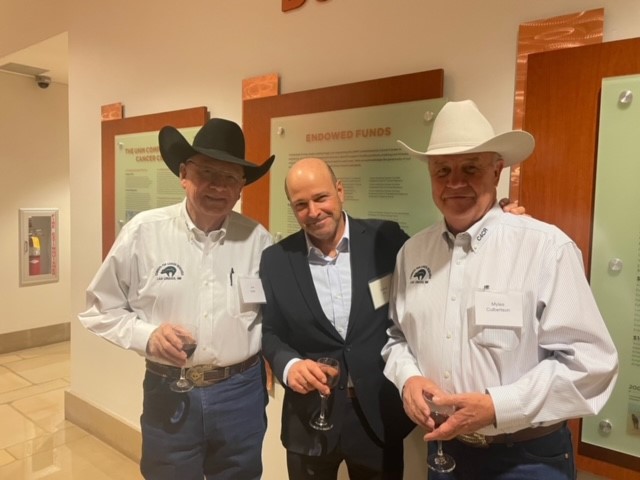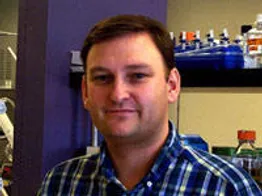Funded Research
THANKS TO YOU
To date 2.8 million dollars has been contributed to The
University of New Mexico Comprehensive Cancer Center
(UNMCCC). The UNMCCC is among the top 3% of
Cancer Centers in the United States with 146 Board
Certified Oncology Physicians that include surgeons in
every specialty. More than 125 research scientists that are
affiliated with UNMCCC have published over 950
manuscripts, filed 136 new patents, and launched 10 new
Biotechnology Start-up Companies, all while providing
education and training experiences to more than 500
students annually in the fields of Cancer Research and
Cancer Health Care Delivery.
At New Mexico State University (NMSU) there are a
multitude of research projects that include: Using cutting
molecular and live cell imaging to develop new drug
combinations that effectively target growth of actively
dividing tumor cells without the side affects of
chemotherapy or radiation. As well as developing
microfluidics technology for early detection, diagnosis, and
treatment of cancer patients. From 2007-2017 C4CR
teamed up with the NMSU Aggies Are Tough Enough To
Wear Pink Campaign to become the largest non-rodeo
Tough Enough To Wear Pink Event in the country.
NEW RESEARCH UPDATE
CTC Early Detection: New Translational Dimensions
Circulating Tumor Cells (CTCs) are pioneers of fatal metastasis and smallest functional units of cancer.
The emergence of CTC clones from primary tumors with metastatic potencies is a fundamental challenge
to address. Defining mechanisms that regulate the survival and evolution of CTCs from primary
melanomas (PM-CTCs) presents the opportunity to suppress metastatic onset and recurrence. The
scientific premise of this proposal relates to the discovery of significant high numbers of human B:PM-CTC
clusters detected either in primary vs metastatic melanoma patients or in humanized NBSGW CTC
xenografts by employing FDA-approved technologies; paired with a critical oxidative-dependent
deregulation of mRNA translation. The hypothesis is that the metastatic competence of PM-CTCs depends
on functional cross talks with human B cells to counteract environmental stresses during CTC
dissemination to distant organs. Experimental objectives aimed to capture CTC early-detection and
delineate the molecular characteristics which affect CTC metastatic spread, recurrence, and/or dormancy.
Findings from this study will provide the comprehensive snapshot of PM-CTC metastatic potential at the
very onset of neoplasticity, along with the identification of key CTC targets for therapeutic efficacy.

Drs. Jeffrey B. Arterburn of New Mexico State University and Eric R. Prossnitz of the University of New Mexico are collaborating to study a new protein (or receptor) that sends signals to cells in response to the hormone estrogen. This new receptor is different from others in that it works more quickly. Dr. Arterburn is working on creating new chemical compounds that selectively activate or inhibit only this new receptor, working to find drugs that can block or “turn on” the protein, depending on what the patient needs. Dr. Prossnitz and his UNM collaborators are testing these compounds for activity in many diseases and conditions, including cancer, autoimmunity and heart disease. In cancer, estrogen accelerates tumor growth in many cases, and the use of drugs to inhibit this new receptor and thereby block estrogen’s activity could mean an important advance in treatment. In addition, Dr. Arterburn is creating new radioactive compounds that can be used to find new ways to image tumors without the need for surgery, leading to improved diagnosis and the evaluation of chemotherapy and radiation therapy. These same radioactive compounds could also be developed as cancer therapies themselves. Drs. Arterburn and Prossnitz and their teams are currently testing all these compounds in mouse models of human cancers and other diseases.



1. PROJECT TITLE: DNA-PKcs mediated DHX9 phosphorylation prevents R-loop accumulation
PRINCIPAL INVESTIGATOR: Amanda K. Ashley, Asst. Professor, Department of Chemistry & Biochemistry.
Dr. Amanda K. Ashley, an Assistant Professor in the Department of Chemistry and Biochemistry is studying a class of nucleic acid structures called “R-loops” that are important for gene expression and have relevance in multiple cancers. This project pursues a strategy for sensitizing tumor cells in combination with other chemotherapeutic agents to improve cancer treatment outcomes. These research studies will use specialized instrumentation facilities for mass spectrometry and cell imaging at NMSU that have been supported by previous C4CR funding. The results from this investigation will provide important data to support Dr. Ashley’s efforts to obtain additional federal funding for this cancer research.
2. PROJECT TITLE: Cell death responses to novel chemotherapeutic compounds.
PRINCIPAL INVESTIGATOR: Charles Shuster Professor, Department of Biology.
Dr. Charles Brad Shuster, a Professor and Department Head in the Department of Biology, is investigating new drug combination strategies that could be effective for cancers that are unresponsive or otherwise difficult to treat with existing drugs, including triple-negative breast cancers. Dr. Shuster will conduct these studies using cancer cell lines with specialized instrumentation for live-cell imaging and other equipment that were supported by previous C4CR funds. These results will provide new insights and data to support major grant proposals to be submitted to federal agencies including the National Institutes of Health and the Department of Defense Breast Cancer Research Program.
3. PROJECT TITLE: Preclinical assessment of synthetic oxabicyclic derivatives as a new class of selective antagonist drugs for ER+ breast cancer without GPER cross-reactivity
PRINCIPAL INVESTIGATOR: Jeffrey Arterburn, Regents Professor, Department of Chemistry & Biochemistry.
Dr. Jeffrey Arterburn, a Regents Professor in the Department of Chemistry and Biochemistry is developing a new class of highly selective targeted drugs for treating breast cancer with fewer side effects, that may remain effective longer, and could avoid the recurrence of certain treatment-resistant cancers. This project will conduct preclinical studies of promising lead drug candidates and plans to obtain technical and business advice using additional resources from the National Institutes of Health that will hopefully lead towards clinical trials in the near future. This research team, with cancer biologist Dr. Eric Prossnitz from the University of New Mexico Comprehensive Cancer Treatment Center, discovered a promising new cancer drug with initial support from a C4CR pilot grant, that is now being evaluated in a Phase I clinical trial for melanoma.


